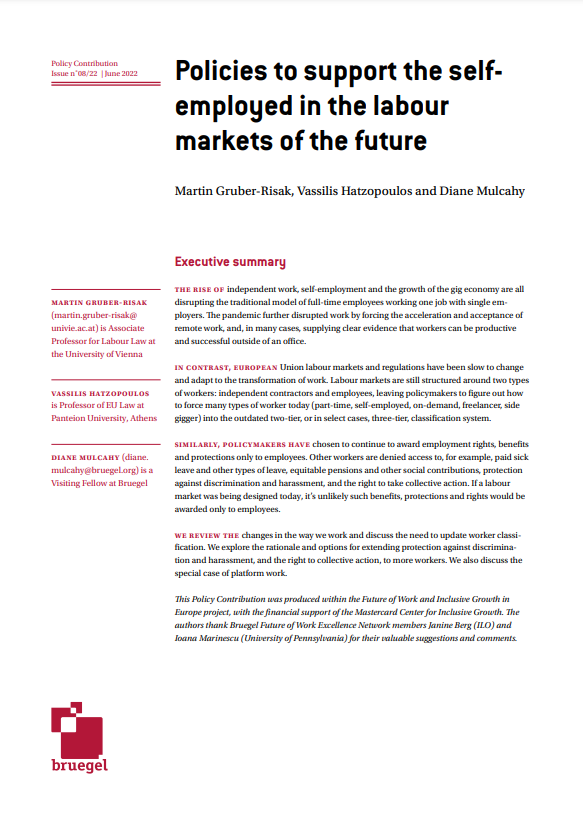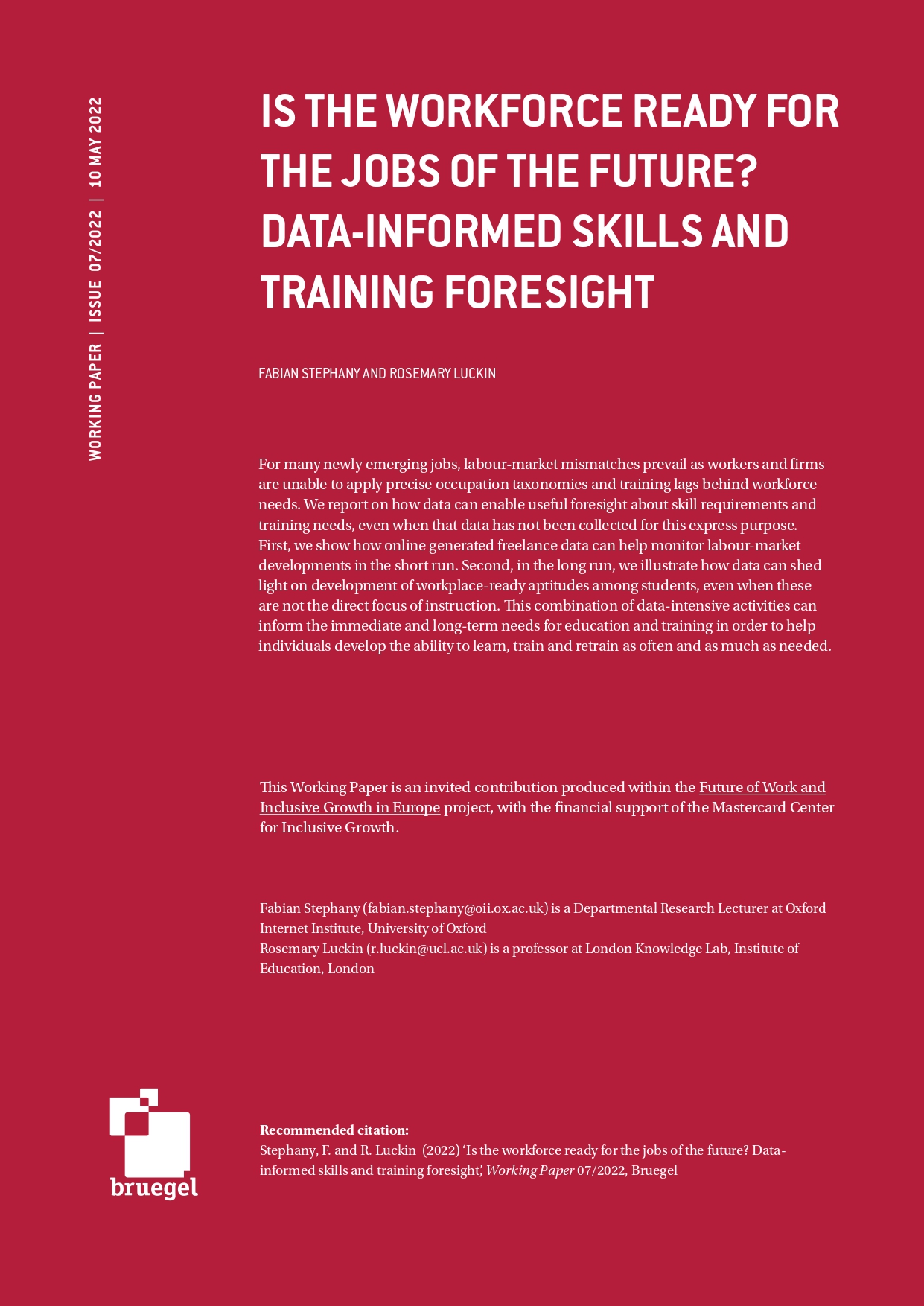Blog Post
Job polarisation and the Great Recession
A job polarisation trend has seen relatively more workers in the European Union employed in skilled and unskilled jobs, while mid-skilled jobs have been squeezed. Since the Great Recession, the supply of university graduates has risen, but the labour market’s demand for skills has not kept up. Graduates have, however, fared better than less-educated workers in terms of wages.
The technological advancements of the last few decades have been a major source of job polarisation. This means that demand for workers has increased for both well-paid skilled jobs (typically requiring non-routine cognitive skills; for example, managerial and professional roles) and low-paid least-skilled jobs (requiring non-routine manual skills, such as cleaning or agricultural jobs), while demand has fallen for workers for middle-skilled jobs that have typically required routine manual and cognitive skills, such as construction or administrative jobs.
This polarisation has been particularly pronounced since the Great Recession of 2007-2009 (for more, see here). Prior to the Great Recession, instead of polarisation, there was a trend of upskilling of the European workforce. Workers tended to shift from middle-skilled jobs to high-skilled jobs. Meanwhile, low-skilled jobs were largely unaffected. However, since the Great Recession, up to 2016, the employment share of middle-skilled jobs dropped by approximately 5 percentage points, while the shares of high-skilled and low-skilled jobs increased, the former by around 4 percentage points and the latter by 1 percentage point.
Figure 1: Changes in employment shares for low-, middle-, and high-skilled workers in selected EU countries for 2002-2009 and 2009-2016
Source (for all figures): Brekelmans, S. and G. Petropoulos. (2020) ‘Occupational change, artificial intelligence and the geography of EU labour markets’, Working Paper 03/2020, Bruegel. See here.
Note: These figures are based on European Union Labour Force Survey data, in which the employment share is calculated for 2002, 2009 and 2016 as the total number of persons employed at each skill level as a share of the total number of persons employed. Change in employment share within a specific period is derived by subtracting the employment share in the first year of the period from the employment share in the last year of the period. The number of persons employed at each skill level is obtained by assigning the occupation of each respondent to the corresponding broad category considered in the source. The countries of our sample are 24 EU members (Bulgaria, Croatia, Malta and Romania not included). The pre-Brexit United Kingdom is part of our sample.
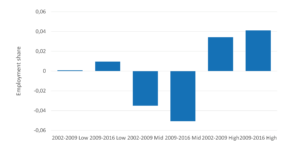
One of the consequences of the Great Recession was an increase in over-qualification in the EU, with the labour market’s demand for skills not keeping up with the rising supply of university graduates. The lack of attractive job opportunities gave individuals an incentive to invest further in their human capital by pursuing university degrees, in order to increase their chances of entering the job market with the best possible range of options. As a result the number of university graduates significantly increased between 2009 and 2016 (Figure 3). Meanwhile, workers were also pushed to accept offers of low-skilled jobs they would not have found attractive in the past (Figure 2). This led to a job polarisation in which both the employment share of low- and high-skilled jobs increased after 2009. In other words, the increase in the number of university graduates has led to increases in graduates taking both high-skill and low-skill jobs, resulting in the polarised picture we observe.
Figure 2: Changes in shares of EU workers with tertiary education in low-, middle-, and high-skilled jobs
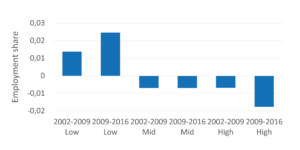
Figure 3: Change in the employment of EU workers with tertiary education at low-, middle-, and high-skilled jobs
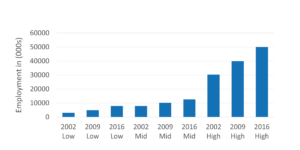
Meanwhile, since the Great Recession, as labour-market competition has intensified, individuals with low secondary education have increasingly been absorbed into low-skill jobs, in contrast to the pre-crisis period when they could more easily move into middle-skilled jobs. From 2009 to 2016 these less-educated workers lost out in terms of mid-skilled jobs. The share of these workers in mid-skilled jobs declined by approximately 6 percentage points.
Despite the increase in over-qualified workers, the benefits from education remain significant. For all educational groups, the post-2009 period saw real wage declines initially, followed by a mild recovery from 2013. Between 2005 and 2016, straddling the Great Recession, real wages in EU countries tended to stagnate. But higher-educated workers (those with tertiary education) still came out ahead, with real wage growth of 1.9% between 2005 and 2018. Upper and post-secondary educated workers saw their real wages increase less, by 1.5% over the same period, while lower-secondary educated workers’ real wages were constant. A common characteristic for each educational group is that post-crisis, the cumulative growth of real wages still has not reached pre-crisis levels (with peak in 2007, Figure 4).
Figure 4: Cumulative percentage changes in real yearly wages by educational attainment in selected EU counties, 2005-2018
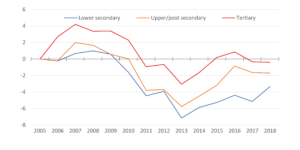 Source and coverage: see source and note to Figure 1. See here for further information on how these cumulative changes are computed.
Source and coverage: see source and note to Figure 1. See here for further information on how these cumulative changes are computed.
This Blog was produced within the project “Future of Work and Inclusive Growth in Europe“, with the financial support of the Mastercard Center for Inclusive Growth.
Recommended citation: Brekelmans, S. and G. Petropoulos (2020) ‘Job polarisation and the Great Recession’, Bruegel Blog, 3 November
Republishing and referencing
Bruegel considers itself a public good and takes no institutional standpoint. Anyone is free to republish and/or quote this post without prior consent. Please provide a full reference, clearly stating Bruegel and the relevant author as the source, and include a prominent hyperlink to the original post.

